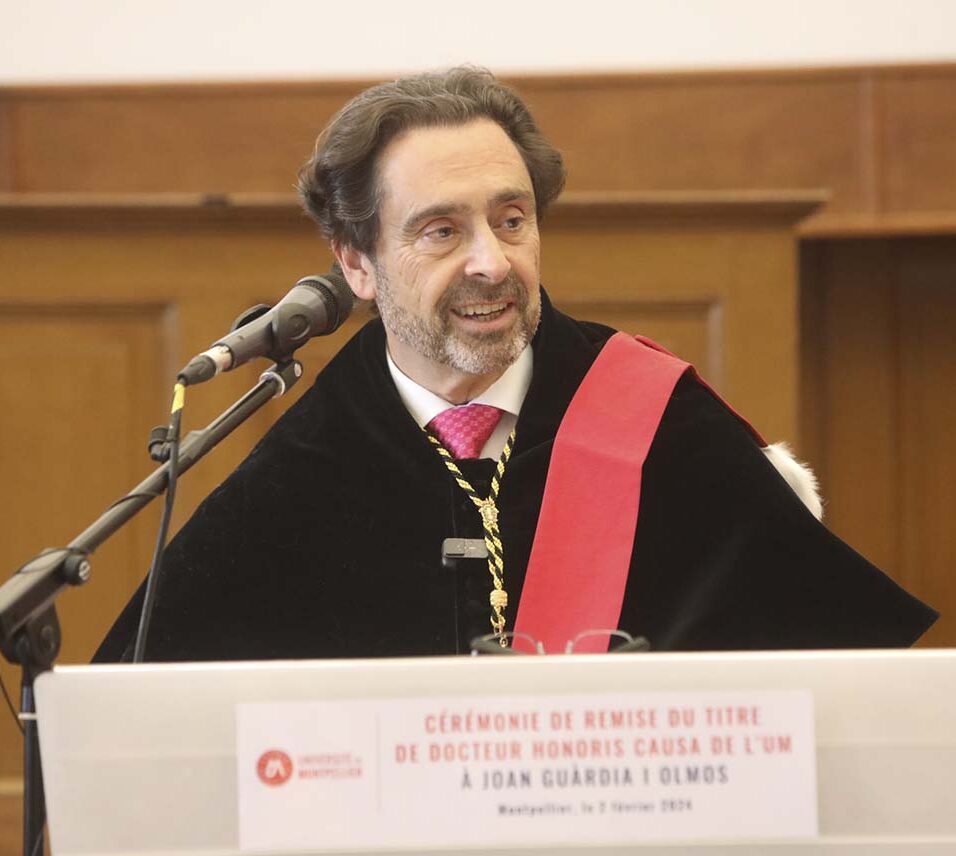Joan Guàrdia i Olmos: teaching at the heart of Europe
Awarded an honorary doctorate by the University of Montpellier, Joan Guàrdia i Olmo is a professor of behavioral science methodology at the Faculty of Psychology at the University of Barcelona (UB). Since 2020, he has also been its rector. He is committed to promoting a Europe of education and research based on shared values.

Every honorary doctorate ceremony is unique. The one for Joan Guàrdia i Olmos, rector of the University of Barcelona, is no exception. If only because the Catalan researcher's sponsor is none other than Philippe Augé, president of the University of Montpellier. In the prestigious setting of the auditorium of the historic Faculty of Medicine building, he declared that this symbolic and meaningful distinction was being awarded to his Spanish counterpart "as an academic, a visionary, and an institution leader with a unique vision of openness towards other European countries and the world."
A distinguished researcher
As an academic, Joan Guàrdia i Olmo has built up an impressive academic background dedicated to understanding the complexity of the human mind. A native of Barcelona, he graduated with honors with a degree in philosophy and education sciences (psychology section) from the University of Barcelona in 1985, before going on to obtain a doctorate in the same field the following year. In 1987, he began teaching as a professor of behavioral science methodology at the Faculty of Psychology and in various other faculties at the University of Barcelona, and has given lectures around the world on topics ranging from neuroscience research to the analysis of psychosocial risks.
"You have had a remarkable career as a researcher, with more than 30 books published and over 250 articles to your credit. You have led more than 25 outstanding research projects, both nationally and internationally, and contributed to more than 40 knowledge transfer and innovation agreements," said Philippe Augé in his laudatory speech.A member of two major research institutes at the University of Barcelona, the Institute of Neuroscience (UBneuro) and the Institute of Complex Systems (UBICS), Joan Guàrdia supervises numerous doctoral theses and leads a research group on quantitative psychology. "Your contributions to structural equation modeling in psychology have marked a significant turning point in our understanding of models for predicting social anxiety," added the president of the University of Montpellier.
Close ties between Montpellier and Barcelona
At the same time, the Catalan researcher has been heavily involved in the management of the University of Barcelona. He served as dean of the Faculty of Philosophy and Letters before being elected rector in December 2020, then recently re-elected on December 5, 2023, for a six-year term. This responsibility at the head of the University of Barcelona has made him a privileged partner of the University of Montpellier, as the two cities have had close ties for many years, notably due to a twinning arrangement dating back to 1963. The fruitful relationship between the two higher education institutions is rich in collaborations. François Pierrot, Vice President for International Relations at the University of Montpellier, highlights their commonalities, including their commitment to "excellent research that contributes greatly to their international visibility" and a concern for "the impact of their work on global sustainable development issues."
A rich academic collaboration marked by landmark agreements such as the inter-university framework agreement signed between the University of Barcelona, the University of Montpellier, and Paul-Valéry Montpellier 3 University in 2015, and the institutional framework agreement on the scope of the I-site signed in 2017, which was officially renewed at the end of the honorary doctorate ceremony. A dual master's degree in water sciences was also launched in 2023.
An opening to Europe
But one of the major joint projects led by the University of Barcelona and the University of Montpellier remains the CHARM-EU consortium, in which Joan Guàrdia has played a key role. "Through your strategic vision, unparalleled leadership, and ability to rally other prominent leaders from member institutions within the alliance, you have been able to generate powerful political momentum at the highest level and initiate fundamental change ," notes Philippe Augé.
Gilles Subra, CHARM-EU project manager at the University of Montpellier, reiterates this point: "Working with five nationalities, and now eight, is not easy. But the UB's approach is based on transparency, respect for everyone's opinion, and a willingness to always reach a compromise through discussion. I believe that this approach is perfectly embodied by its president, Joan Guardia."
A shared academic future
In a speech delivered entirely in French, the rector of the University of Barcelona spoke about the challenges facing Europe in the fields of education and research, and the need to build a common academic future despite the many obstacles to be overcome."The concept of a European university inevitably involves change, shared paths, coordination above individual strategy, and honest collaboration," he said . While acknowledging the progress made, he added: "During these eight years of working with European alliances, an indisputable reality has been built. Proof that a wind of Mediterranean fraternity with a European flavor continues to blow over Montpellier.
CHARM-EU: building the university of tomorrow together
The CHARM-EU alliance of European universities was launched in 2019 on the initiative of the University of Barcelona under the leadership of its then rector, Joan Elias Garcia, in response to the first Erasmus+ call for projects from European universities. In June 2019, the CHARM-EU project was one of 17 winners, bringing together five partners under the coordination of the University of Barcelona, including the University of Montpellier, the University of Utrecht (Germany), Trinity College Dublin (Ireland), and Eötvös Loránd University in Budapest (Hungary). Five European universities have joined the CHARM-EU alliance: Åbo Akademi University (Finland), the University of Würzburg (Germany), Entrepreneurship (Germany), and the University of Bergen (Norway). "We can applaud the bold choice made by the University of Barcelona as coordinator to work on a global dimension linking teaching and research and involving all of the university's missions from the outset in order to truly create a sustainable strategic alliance," notes Gilles Subra, CHARM-EU project manager at the University of Montpellier.
To fully explore this approach to transnational higher education alliances, a jointly developed master's program was launched in 2021. Entitled Global Challenges for Sustainable Development, this research-based, cross-disciplinary program focuses on solving real-world challenges in line with societal issues. The CHARM-EU alliance has numerous projects: a catalog of joint international courses, the introduction of microcredits, the development of a team-based doctoral program, and more. Today, only 10% of universities in the 27 member states of the European Union participate in an alliance, yet around 50 European university alliances have already been created, involving more than 40 French universities.
